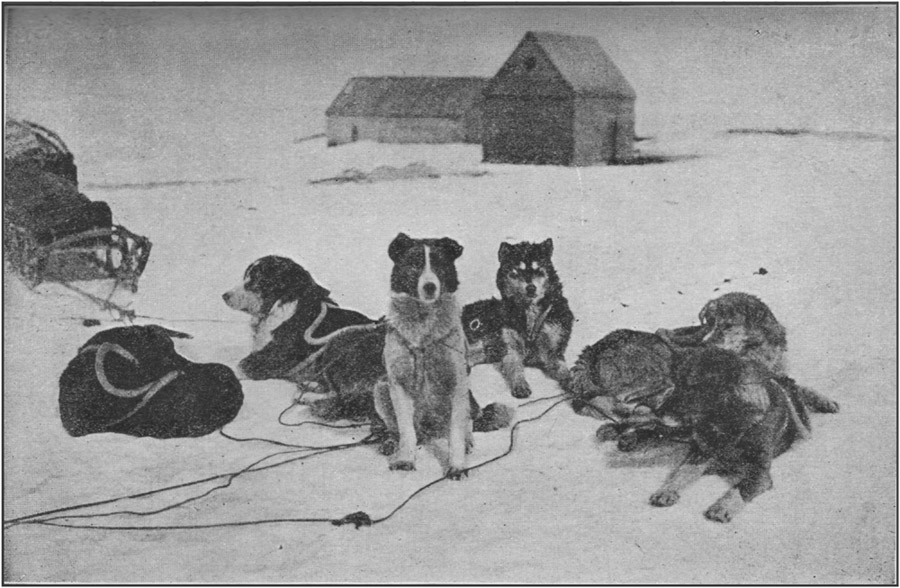
REAL GRATITUDE.
THE following is the true story of a little boy who by his bravery won the name "The Boy Hero." He lived in Newfoundland, which has not a pleasant climate like ours, but is very cold and dreary. You will find it on the northeastern coast of North America.
The people who live in this cheerless place are very poor; they have no comfortable houses to live in, no nice clothing to wear, and no dainty food to eat. Their dwellings are huts of mud, their clothing is made from the skins of the bear and the wolf, and their food is principally fish.
Would the boys and girls who read this story like to live in such a way? I fear the most of you would think it very hard to be dressed in a bear's skin, and have to eat half-cooked fish and poor bread.
But although this boy was deprived of many blessings which you enjoy, God had given him a kind father and mother, who loved him as dearly as your parents love you, and who were glad to do all they could to make him happy.
But he was not long to share the love and care of these fond parents; for while he was yet very young, his father was taken from him by the cruel fever, which passes like a scourge over this barren country. Soon after this, his kind mother was also taken, leaving the poor child alone in the world, with no one to care for him. With God, who cares for the fatherless, opened the hearts of a kind family, who, though very poor, and having two small children of their own, took the little wanderer, and shared their scanty living with him.
Fishing is the chief occupation of these people, and at the beginning of their short summer an English brig takes them up the coast to Labrador, which you all know is noted for its fisheries. The families are left about ten miles apart, as the vessels sail; but following the coast over hill and dale, and around bays and capes, it is often twice as far. This family was left the farthest up the coast, and a long distance from any human being.
Here they made a home, such as it was, and went to work. The father and his foster child caught the fish, while the mother prepared the meals, and did the rest of their meager housework. They worked away, and things went on finely, until, from exposure and overwork, the husband and father sickened and died; thus leaving the poor mother with two small children to care for, and no one to aid her but this little boy.
He did not sit down and cry, as many would have done; but manfully, as best he could, filled the place of the dead father. He cheered the heart of the sad mother, and although only twelve years old, kept on fishing, as he had seen his father do. Soon a new sorrow came to him, for in a few weeks the mother, his only living dependence, was taken away, and the three children were left alone.
But the noble boy, with dauntless courage, cared for the younger ones, cooked the fish, and made the bread of meal and water, as he had seen his mother do, and kept on fishing.
Finally the fish failed, and their chief supply of food was thus cut off. This, however, did not dishearten him. Thinking that the brig would come for them as it usually did, he waited until his store of provisions was nearly gone. Then, knowing that he must do something, he cooked up what meal and fish he had, and taking the two children with him started down the coast to the nearest family, a distance of more than twenty miles.
For days he led on his little charges over rocks and hills, cheering and helping them forward as best he could, until, tired and nearly sick, they could go no farther. With loving tenderness, he found them a sheltered place among the-rocks, left them all his food, and started on alone, half-starved and not knowing when he would find friends. Bravely he struggled forward, and finally, just at nightfall, he reached the hut he was seeking. The men were away fishing, but he told the women how he had left the children; and then, I suppose, many of us would have considered our duty done. But it was not so with this little boy.
His gratitude to the friends who had been so kind to him was such that he wanted to do all that he could for their orphan children. After eating something himself, and taking food for the children, he started back to find them.
In the early morning the kind fishermen went to search for them, but only two were alive. The night had been bitterly cold, and our noble boy had taken off his jacket to protect the suffering little ones. Finding this was not enough, he laid his own body over them, and when they were found, the Angel of Death had been there, and the poor boy was frozen stiff. The children however, were alive and warm. Brave boy! He gave his life for his friends, and was he not a hero?
The above story was told me by our great American artist, William Bradford, who has been on many expeditions to these cold regions. Here he obtained the themes for many of his elegant paintings.
HATTIE WARREN.